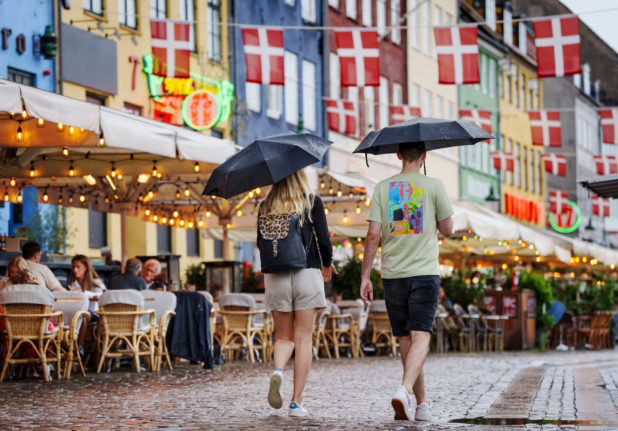We also asked whether taking on Danish habits had been a conscious decision, and whether they felt their outcomes had been positive.
Many thanks to all those who took time to get in touch – we appreciate the many responses we received.
“Drinking more coffee,” began Balint from Hungary, who moved to Copenhagen last year.
“I talk less about my personal life with my colleagues,” he added.
“I have a Dannebrog [Danish flag, ed.] at home,” Balint also said.
READ ALSO: Why do Danes love the Danish flag so much?
Making an effort to eat Danish food was a theme mentioned by many readers as an adaptation in their habits since arriving in Denmark.
“One example is I was asked to try licorice enough times that now I genuinely enjoy the mild ones, but I’ll never be converted on the truly salty stuff,” said Hugh from Ireland, who lives in Horsens and has been in Denmark for almost 7 years.
Sonia from India, who lives in Copenhagen, said that “having lunch at 11:30 am and starting to eat rye bread,” were among her newer Danish habits.
“Also to have as dim and warm light at home as possible, trying to create hygge,” she said.
READ ALSO: Why do Danes eat lunch so early?
“I have learned how Danes do things from what they put on their bread to what are their social norms, and I have adapted the things I find practicable. I don’t do it just to ‘fit in’, I see it more as growing here, as I moved here just out of high school,” said Laura, who moved to Denmark at the age of 19 and has lived around Aarhus since 2011.
These adaptations were automatic, rather than a result of feeling pressured to fit in, Laura said.
“I really hadn’t thought about it until I had already become ‘more Danish’ and realised that my way of doing things differs from the way of my relatives,” she said.
Others said their changes were a conscious effort, at least partially.
“There was more pressure while in a past relationship, but some of it has developed via osmosis,” Hugh said.
“An interesting one is dead pan sarcasm. It took me years to get my head around it, but now it’s easy. I do have to dial it back or be more obvious when being sarcastic at home,” he observed.
READ ALSO: Why don’t foreigners ‘get’ Danish humour?
For Sonia, “some of it was conscious, mainly trying to integrate especially at work.”
This felt “a bit weird initially, but then it became natural,” she said.
Another area where many said they adapted, either consciously or subconsciously, was by changing the way they socially interact – usually by becoming more withdrawn.
“I stopped greeting people with handshakes, hugs and kisses on the cheeks,” said Caio Silva from Brazil, who has lived in Kongens Lyngby for the last two and a half years.
“This was a conscious decision.
“I noticed that greeting with body touch was not common in Denmark and I decided to stop doing that. I only do it with very close friends now,” he said, but admitted it made him “feel more distant from people.”
“I have started to plan ahead my social activities to make sure that my Danish friends are available,” said Alex from Venezuela, an Aarhus resident for the last three years.
Alex said he would “never see my Danish friends” if he didn’t do this, but that he was fine with it.
“I like it, I don’t feel frustrated. However, it doesn’t feel like my natural way of acting,” he said.
Some readers – such as Nana, a Denmark resident of four and a half years – said they have not made themselves any more ‘Danish’ during their time here.
“But I do appreciate the no frills Danish culture and lifestyle,” Nana said.
“I didn’t feel pressure [to change] as I know I’m in Denmark temporarily as a mobile international civil servant,” Nana said, adding that she “loves the Danes” but doesn’t “feel pressure to be more Danish.”
Becoming more Danish meant “following the rules” for Varghese from India, who has lived in Kolding for 12 years.
“Like waiting at a traffic light to turn green no matter the time,” he said. For Varghese, this was a positive. “Rules give order which leads to benefits like peace and certainty,” he said.
Another reader, Greg from Ireland, also mentioned waiting for the green light on pedestrian crossings – which is mandatory under Danish traffic laws even when there are no vehicles approaching the crossing.
READ ALSO: Why don’t Danish drivers stop at pedestrian crossings?
Greg said he had learned “not to get frustrated when walking and waiting for the green man when you can see the road is clear”.
“It’s polite to adjust to local customs,” Greg said, adding he felt “grand” about becoming more Danish.
This sentiment was echoed by several readers, including AJ, who moved to the Copenhagen area from the UK five years ago.
“I think it’s important to embrace the culture of the country you call home and it’s fun to learn new things,” she said.
“Although we still celebrate Christmas on 25th December,” she added with a smiley.



 Please whitelist us to continue reading.
Please whitelist us to continue reading.
Member comments